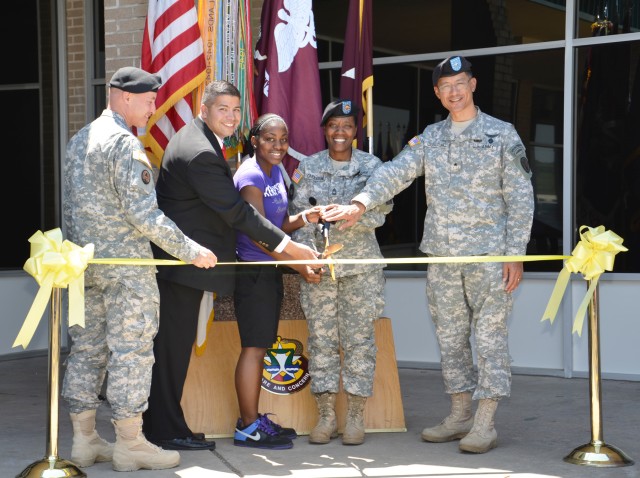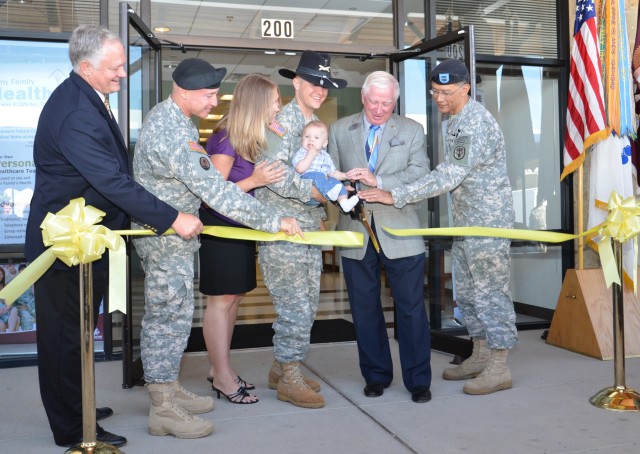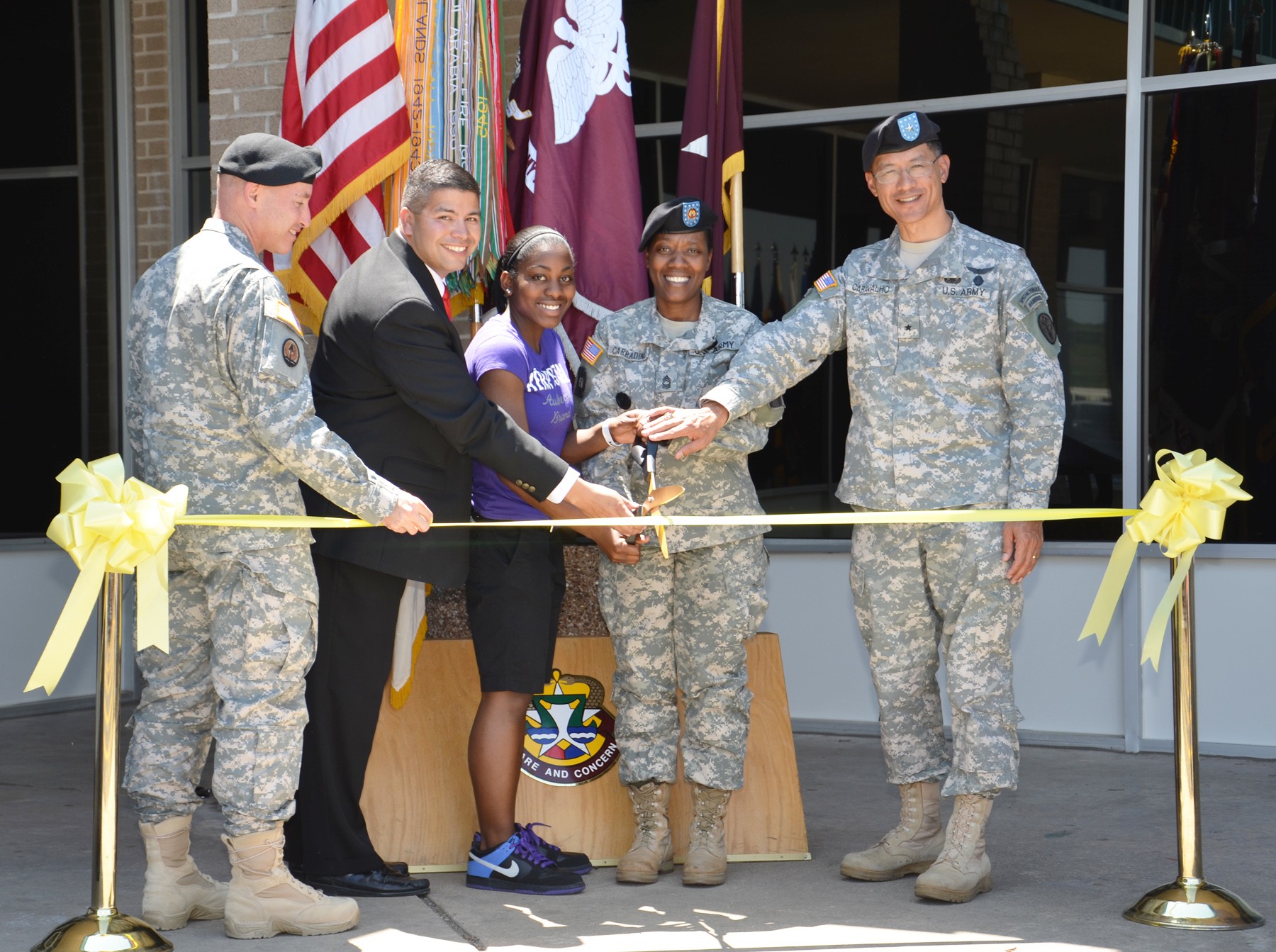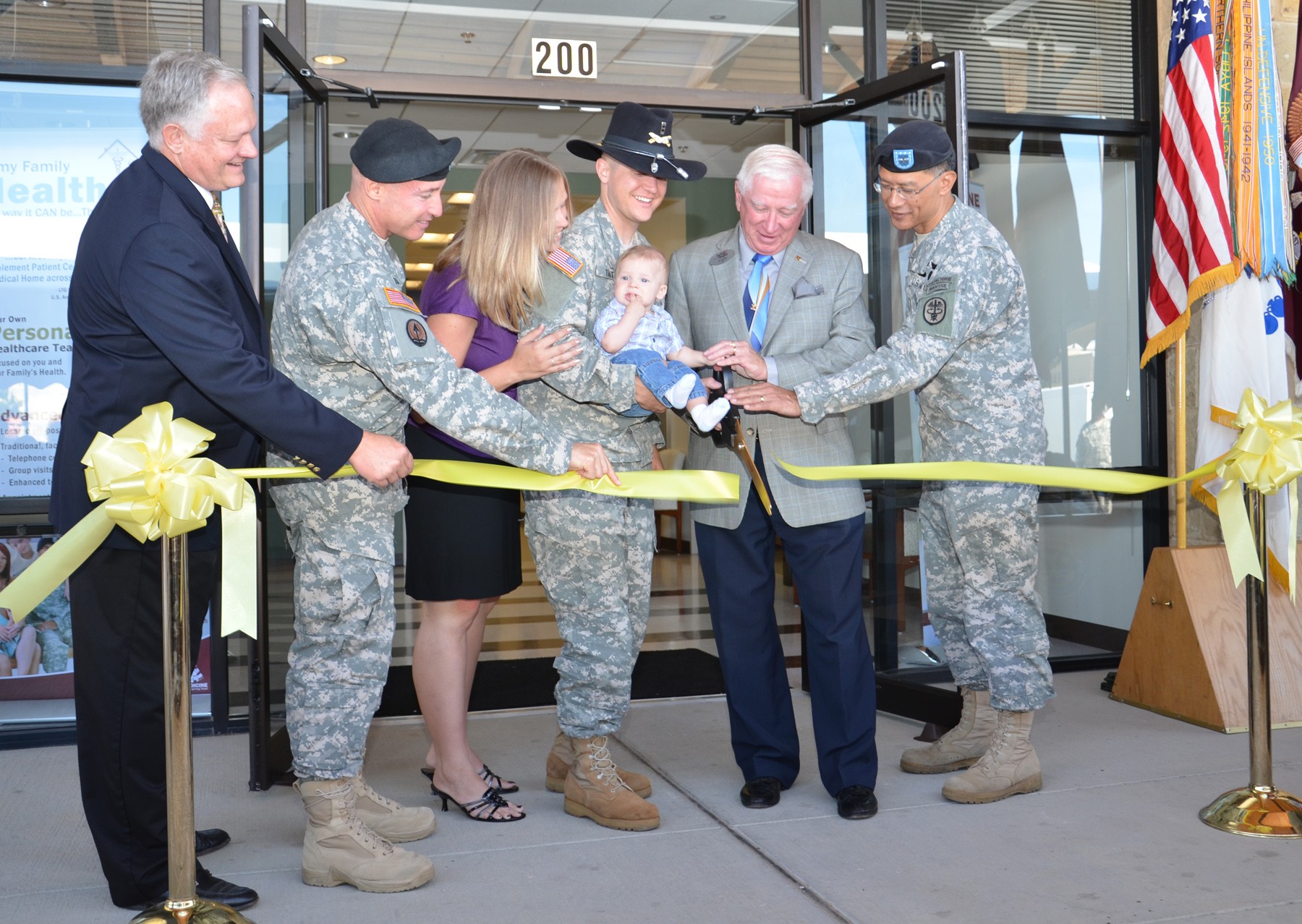Fort Hood military clinics in civilian communities give patients a "hometown doctor" feeling
By Patricia Deal
CRDAMC Public Affairs
FORT HOOD, Texas Aca,!" The idea of personal care from a Aca,!A"hometown doctorAca,!A? is becoming a reality for Fort Hood active duty military service members and their families.
In ribbon-cutting ceremonies May 17, Carl R. Darnall Army Medical Center officially opened two new community-based Medical Homes, one in the Market Heights shopping center in Harker Heights and one in the Town Square shopping mall in Copperas Cove.
Another Medical Home is scheduled to open in Killeen in July.
The Fort Hood Medical Homes are among 17 community-based care clnics that the Medical Command has opened in 11 communities across the continental U.S. and Hawaii.
Both revolutionary and old-fashioned, MEDCOM officials state the concept for the Medical Homes is based on a new patient-centered model of healthcare being adopted across military and civilian healthcare systems. The idea is to help military families develop the same trust and relationship with doctors and nurses that many civilians have with their local doctors.
The clinics are based where patients live, thus making access to care more convenient. The clinics also offer continuity of care as patients are assigned to a team headed by a physician that will manage and track their care. Patients see familiar faces with every visit.
Aca,!A"At its heart, the community-based medical home is healthcare the way it should be Aca,!" easy to access, patient-centered, team based and quality focused,Aca,!A? said Brig. Gen. Joseph Caravalho, commander of the Southern Regional Medical Command at Fort Sam Houston, Texas, who was the guest speaker for both opening ceremonies.
The Medical Homes are like a business franchise operation, with every home delivering the same quality of healthcare, Caravalho explained, an important concept for military families who move around frequently.
Aca,!A"Community-based Medical Homes are a step in the right direction as Army Medicine strives to provide consistent and memorable primary healthcare to our Soldiers and their families no matter where they go within our system,Aca,!A? Caravalho added.
Colonel (Dr.) Steven E. Braverman, CRDAMC commander, told the audiences the continuity of care patients receive at Medical Homes helps build trust in Army Medicine, Aca,!A"going beyond the obvious trust between patient and provider.Aca,!A?
Aca,!A"The openings of these clinics are tangible proof that we are dedicated to providing our beneficiaries with the highest quality and access to health services,Aca,!A? he said. Aca,!A"The convenience and continuity of care offered by the Medical Homes make patients more confident and comfortable with their health care, which ultimately helps improve their health and wellbeing.Aca,!A?
Braverman added that another advantage to having community-based clinics is they provide better utilization of manpower and resources which will allow Darnall and the Fort Hood clinics to adopt the same personalized and continuity of care approach.
More than 3,000 Family members have already enrolled in the three clinics.
Chief Warrant Officer Jesse Tait, 2nd Battalion, 227th Aviation Regiment, 1st Air Cavalry Brigade, 1st Cavalry Division, said he hasnAca,!a,,ct seen this type of clinic before but said the Medical Home is perfect for his wife, Sarena, and their four children.
Aca,!A"I am so happy now that my children and I can go to the same clinic. I especially like the idea of one provider taking care of all of us. It feels much more personalized and Aca,!Eoehomey,Aca,!a,,cAca,!A? Sarena said. Aca,!A"We live in Nolanville and the convenience of having a clinic in Harker Heights is absolutely wonderful. I will be able to save so much time now that I wonAca,!a,,ct have to drive all the way out to West Fort Hood. And I like that I can make back-to-back appointments so I donAca,!a,,ct have to make several trips.Aca,!A?
Master Sgt. Lamisa Carradine, 479th Field Artillery Brigade, Division West, also said she thinks the Medical home is a great idea. She was the first to enroll her family at the Copperas Cove clinic.
Aca,!A"As soon as I heard about the Medical Home, I didnAca,!a,,ct hesitate to sign up. ItAca,!a,,cs only two minutes from my home. ItAca,!a,,cs a snap to get my daughterAca,!a,,cs prescriptions here,Aca,!A? Carradine said. Aca,!A"I also like that itAca,!a,,cs so one-on-one here. Everyone knows your name and is so accommodating to whatever we may need.Aca,!A?
Each Medical Home is designed to provide a full range of medical care and services. Each home has 18 examining rooms, a pharmacy and lab and is staffed with 35 Army civilian medical professionals, including physicians, lab techs, administrative personnel, pharmacists and nurses.
Both women said they like that they can do almost all of their health care at the clinics. But the best thing, both women added, is the reduced wait times, especially at the pharmacies.
Aca,!A"Everyone seems to like that about the clinic. We filled about 63 prescriptions on our first day and everyone was just thrilled with the short time they had to wait,Aca,!A? Josephine Oira, pharmacist at the Harker Heights Medical Home, said.
Not only does the patient-centered healthcare improve patient satisfaction, it is also designed to improve job satisfaction for the staff.
In her 22-year career as a physicianAca,!a,,cs assistant, Molly Leitnaker, from the Copperas Cove Medical Home, has worked at clinics in the civilian sector as well as military clinics. She said this is a good move for the Army.
Aca,!A"ItAca,!a,,cs going back to the traditional personal care you would receive from your family doctor back in your hometown. In this type of setting, providers get a chance to really know their patients and their medical needs,Aca,!A? she said. Aca,!A"ItAca,!a,,cs especially hard for military families to establish relationships with their doctors and get the same type of care because they move around so much. But now with the Medical Homes, they can get the same, family-centered health care, wherever they go.Aca,!A?
Each clinic has a Medical Home group practice manager who ensures the quality and continuity of care at the clinic.
Aca,!A"The Medical Home is a great fit for Copperas Cove with its Aca,!Eoesmall town atmosphere but big city spiritAca,!a,,c that welcomes Soldiers and their families into the community," said Rick Montelongo, group practice manager for Copperas Cove. Aca,!A"The clinic is a benefit for the patients, as we offer that small town, local doctor type of atmosphere but with a big commitment to ensure that patients have access to the best healthcare available.Aca,!A?
Noel Webster, group practice manager for the Harker Heights Medical Home said it is a, Aca,!A"win-win situation for Harker Heights, our Soldiers and their families.Aca,!A?
Aca,!A"The clinic is convenient and offers a full-range of professional medical care,Aca,!A? he said. Aca,!A"Getting your care away from the main hospital doesnAca,!a,,ct mean you are detached from the Army healthcare system. Patients can be confident that we are fully staffed and equipped with the latest technology to manage their healthcare.Aca,!A?
Harker Heights Medical Home serves military families living in Harker Heights, Nolanville, Belton, and Salado. Copperas Cove Medical Home serves military families living in Copperas Cove, Kempner, Lampasas, and Gatesville. Each clinic has a capacity to serve more than 8,000 eligible beneficiaries.
--30--




Social Sharing